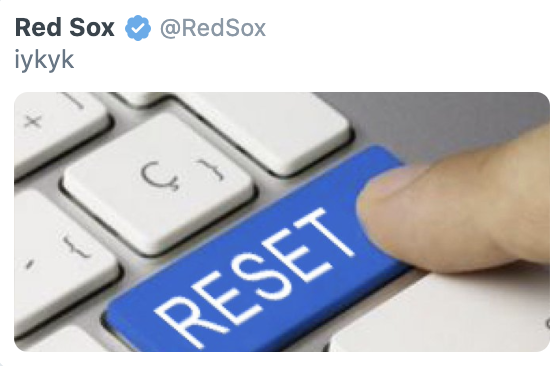Clueless Red Sox tweet captures everything wrong with baseball in 2020
The Boston Red Sox have gone out of their way to make themselves wholly uninteresting in 2020. Between making pitcher Martin Perez their biggest free-agent acquisition and trading away homegrown superstar Mookie Betts and 2018 World Series hero David Price, the team begged fans to look away and watch something else in 2020.
But for one brief and regrettable moment Tuesday, the Red Sox captured the attention of the baseball world. They did so with this incredibly dumb — and now deleted — tweet.

The tweet is a take on a meme that usually features a person hitting the “upgrade” button on a keyboard. The Red Sox replaced the word “upgrade” with “reset.”
The text on the tweet read “iykyk,” which stands for, “If you know, you know.” The Red Sox were referencing the team resetting the luxury tax in 2021. By not spending much in the offseason and offloading a few players at the 2020 deadline, the Red Sox were able to reset the penalty the team would pay if it exceeds the luxury tax — also known as a the competitive balance tax — in 2021.
Welcome to baseball in 2020, where a team with a 12-23 record and an owner worth $2.7 billion can celebrate saving some money.
The Red Sox eventually realized the tweet was a terrible idea and deleted it. The team tried to save face by joking about making a bad tweet.
You ever miss with a tweet? Same.
— Red Sox (@RedSox) September 1, 2020
Red Sox are not the only team trying to save money
While the Red Sox tweet marked the first time a team Twitter account bragged about resetting the luxury tax, the Red Sox are far from the first team to utilize the tactic. The New York Yankees and Los Angeles Dodgers — two teams known for their immense spending — did the same thing in 2018. Countless other teams have used the luxury tax as an excuse to avoid signing big-name free agents. The Washington Nationals didn’t want to exceed the luxury tax during the offseason in which they lost Bryce Harper. The Chicago Cubs didn’t want to pay the extra fees associated with the luxury tax to sign Harper that offseason either.
The fines for exceeding the luxury tax may look steep, but don’t amount to much in baseball. In 2018, the Red Sox and Nationals were the only two teams that entered the season over the luxury tax. If the Red Sox kept payroll exactly the same that year, the team faced a $9.4 million tax at the end of the season. That was less than the Red Sox paid outfielder Rusney Castillo to stay in the minors that year. Castillo made $11 million in 2018.
The luxury tax penalties do increase if a team exceeds the tax for consecutive years, so teams view it as advantageous to come in under the tax every couple seasons to reset the percentage they owe the next time they exceed the luxury tax.
Even then, the fines associated with the tax aren’t as exorbitant as teams would have fans believe. If a team can pay a player $11 million to go away, it can pay a $9.4 million tax to field a championship-caliber roster.

Why did the Red Sox brag about resetting the luxury tax?
It shouldn’t come as a surprise that MLB teams and owners are trying to save an extra dime. The avoidance of the luxury tax, combined with the glacial pace of some recent offseasons and the dwindling of baseball’s middle class have made that clear.
The bigger question is: Why did the Red Sox think it was a good idea to send the tweet in the first place?
The answer is that this is what fans have come to accept in the game. Michael Lewis’ fantastic book “Moneyball,” and the sabermetric analysis that book inspired, undoubtedly shaped how fans have adjusted their views on team building. The takeaway from “Moneyball” should have been: “Imagine how good the Oakland Athletics would be if the team spent money.” Instead, it became: “The Oakland Athletics don’t need money to field a good team.”
That philosophy has fueled MLB teams ever since. The Tampa Bay Rays are among the teams consistently praised for dealing franchise stars like Evan Longoria and Price the instant those players become expensive. The Pittsburgh Pirates would rather bet on younger, cheaper players than pay Andrew McCutchen more money. The Cleveland Indians are going to let Francisco Lindor — the best shortstop in baseball — walk because they don’t want to pay Lindor what he’s worth. That’s just good business.
While some may argue those are all small-market teams — despite the fact that all those teams’ owners, with the exception of Tampa’s Stuart Sternberg, are worth more than $1 billion — this issue isn’t limited to the franchises that typically field low payrolls.
Now, the big spenders have adopted the same approach. The Red Sox are no longer willing to retain a top-3 player in baseball, a homegrown star and a sure-fire future Hall of Famer in Betts because they fear a $10 million tax. This is the same franchise that spent boatloads of money on Manny Ramirez and tried to trade for Alex Rodriguez and his massive contract in the 2000s in a desperate attempt to break their World Series drought. Why? Because winning was the only thing that mattered.
That’s not the case any longer. Teams have prioritized profits over World Series championships. A team that wants to win games signs Betts no matter the cost. A team that only wants to win if the price is right sends Betts packing.
The fact that the Red Sox felt comfortable sending that tweet in the first place tells you all you need to know about where the team’s priorities lie.
More from Yahoo Sports:
